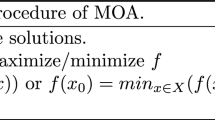Abstract. Our experimental design mimics a traditional evolutionary game framework where players are matched pairwise to play a symmetric 3\(\times\)3 bimatrix game that has two Nash equilibria. One equilibrium is an evolutionary stable state, or ESS; the other is an equilibrium in dominated strategies. Our primary experimental result is the observation that the ESS becomes extremely attractive when subjects have minimal information about the payoff functions, although the dominated equilibrium assures the highest equilibrium payoff. The attractiveness of the ESS is only moderate when players are completely informed about the 3\(\times\)3 payoff matrix.
Similar content being viewed by others
Author information
Authors and Affiliations
Additional information
Correspondence to: S.K. Berninghaus
Rights and permissions
About this article
Cite this article
Berninghaus, S., Ehrhart, KM. The power of ESS: An experimental study. J Evol Econ 13, 161–181 (2003). https://doi.org/10.1007/s00191-003-0150-3
Issue Date:
DOI: https://doi.org/10.1007/s00191-003-0150-3




